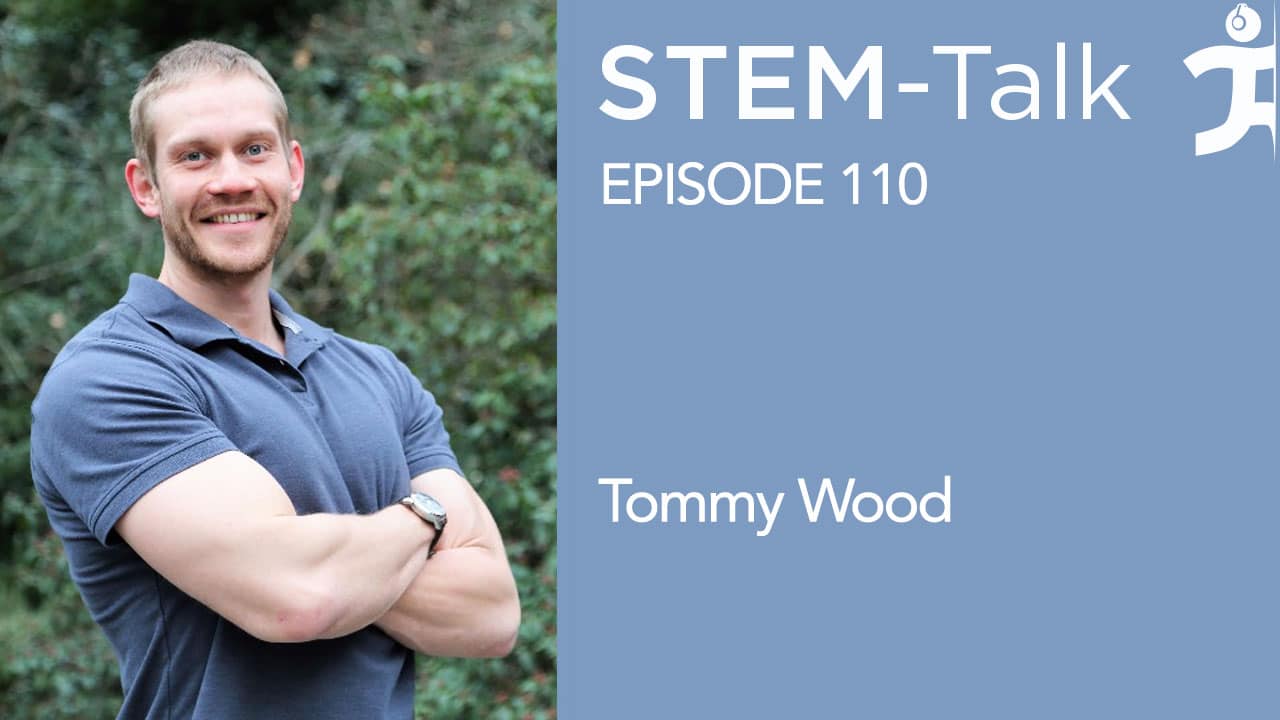STEM-Talk
Episode 110 : Tommy Wood talks about nourishing developing brains and the importance of metabolic health
// Aug 4, 2020

Dr. Tommy Wood is a UK-trained physician who is making his third appearance on STEM-Talk. Earlier this year before the COVID-19 outbreak, Tommy gave a well-attended lecture at IHMC about the latest research on building and preserving brain health across people’s lifespans. The lecture was so popular we invited Tommy to join us for another STEM-Talk interview.
Tommy is a research assistant professor of pediatrics in the University of Washington Division of Neonatology. He was our guest on episodes 47 and 48 of STEM-Talk. Tommy received his undergraduate degree in biochemistry from the University of Cambridge and a medical degree from the University of Oxford. In addition to working with newborn infants who have brain injuries, Tommy also develops performance optimization strategies for athletes such as Formula 1 racecar drivers and Olympians.
As in our first STEM-Talk interview with Tommy, our conversation was so long and wide-ranging that we have divided it into two parts. In today’s episode, we talk to Tommy about the importance of metabolic health, especially as a way to protect ourselves from COVID-19. We touch on Tommy’s work at developing accessible methods to track human health and longevity, and also his research an assistant professor of pediatrics at the University of Washington where he studies ways to increase the resilience of developing brains.
In part two of our interview, we talk to Tommy about his continuing research into lifestyle approaches to improve health span and lifespan and physical performance. We also have a fascinating discussion about the physiological and metabolic responses to brain injury and their long-term effects on brain health.
Show notes:
[00:05:15] Dawn asks about an article Tommy and a colleague recently wrote, in which Tommy points out that it is becoming increasingly clear that underlying conditions associated with suboptimal metabolic health appear to be associated with poor outcomes in patients with COVID-19. Considering the nature of these underlying conditions, such as obesity and hypertension, he argues that lifestyle-based approaches to protecting ourselves from COVID-19 are likely to be one of our best tools in addressing this ongoing pandemic as well as future pandemics. Tommy summarizes his key points from the article.
[00:09:38] Dawn mentions that when Tommy was last interviewed on STEM-Talk, he had just become a senior fellow at the University of Washington and was in the process of moving permanently to the U.S. She goes on to mention that when she asked Tommy what brought him to the states, he said “a girl,” who he ended up marrying. The girl turned out to be Elizabeth Nance who was interviewed on episode 71 of STEM-Talk. Dawn asks how Elizabeth is doing. [00:10:51] Tommy gives an overview of his work as a research assistant professor of pediatrics at the University of Washington in the division of neonatology, where his focus is on ways to increase the resilience of developing brains and also ways to treat neonatal brain injuries. [00:12:45] Dawn explains that Tommy gives a disclaimer at the beginning of his talks that “many of my best ideas are stolen.” She asks what are his best sources for ideas. [00:14:42] Dawn mentions that when Elizabeth was on STEM-Talk, she mentioned that Tommy was constantly reading paper after paper, to the point that it is dizzying to look at Tommy’s computer screen. Tommy describes his research methods and how he goes about collecting material. [00:16:51] Ken mentions that Tommy’s current research interests include the physiological and metabolic responses to brain injury and their long-term effects on brain health. Ken asks about this as well as Tommy’s work to develop easily accessible methods to track human health, performance, and longevity. [00:18:59] Dawn asks why even as a neonatal neuroscientist, Tommy is still interested in working with football players, Formula 1 drivers, and Alzheimer’s patients. Dawn goes on to say that while most neuroscientists specialize in one of the populations, Tommy prefers to look at the brain from cradle to the grave. [00:21:44] Tommy explains how he uses Maslow’s Hierarchy of Needs to explain to people what their brain needs. [00:23:48] Dawn mentions that Tommy finds recent brain-age studies to be particularly fascinating because they are just now beginning to show how fetal/neonatal exposures effect adult aging. [00:26:01] Tommy explains the energy demands of the developing brain, and why it takes up 75% of an infant’s metabolic rate. [00:27:12] Dawn mentions that Tommy published a paper last year about the potential use of exogenous ketones for neonatal neuroprotection, which starts with the idea of ketones being essential for the newborn brains. [00:28:53] Ken notes that ketone bodies play a major role in the central nervous system during myelination, not only as a source of energy, but a source of carbon for lipid biosynthesis. Tommy explains the significance of this function of ketone bodies. [00:30:47] Ken asks about unsaturated fats, and their role in brain development. [00:32:14] Dawn asks about the significance of the mother’s diet during infant development, mentioning the work of the late Sheilla Innis, a researcher and proponent of the nutritional needs of babies, children, and expectant mothers. [00:34:13] Dawn mention’s that linoleic acid is a polyunsaturated omega 6 acid that is one of two essential fatty acids for humans. She goes on to explain that since the early ‘60s, the amount of linolenic acid in Americans has increased dramatically, and that it has also has increased dramatically in women’s breastmilk. She asks if this is a problem. [00:36:54] Ken mentions that in the lecture Tommy gave at IHMC, he talked about how people may be suffering from a deluge of processed oils that have become staples of our modern diet. Ken asks Tommy to clarify this and explain the issue with processed oils, and what his advice is on how to deal with that issue. [00:41:11] Dawn explains that Docosahexaenoic acid, or DHA, is a type of omega-3 fat. Since our bodies can only make a small amount of DHA, we need to consume it directly from food or a supplement. There have been studies that have shown women who consume 600 to 800 mg of DHA daily during pregnancy reduced their risk of early preterm birth. Dawn asks about the risks low DHA in an expectant mother and if it raises a mother’s risk for a preterm birth. [00:43:07] Dawn mentions that reducing preterm birth is critically important because depending on how prematurely a child is born, they have about a 30% to 50% chance of dying or having a severe disability. She asks what recommendations Tommy has for expectant mothers in terms of reducing premature births. [00:45:30] Dawn asks about something Tommy said in his recent lecture at IHMC, where he quoted Ken as saying, “Humans have, roughly since agriculture, become dumber, weaker, and more frail.” [00:47:35] Ken asks Tommy, given the rise of Alzheimer’s and dementia, and the prevalence of the modern western lifestyle, how does one prevent the brain from declining over time. [00:49:48] Tommy gives an overview of the Amyloid-beta precursor protein, which is a large membrane protein that normally plays an essential role in neural growth and repair. Later in life, however, Amyloid-B can become corrupted and can destroy nerve cells, which leads to the loss of thought and memory in people with Alzheimer’s disease. [00:51:06] Tommy explains why despite the billions spent by the pharmaceutical industry on trials aimed at targeting Amyloid-beta, there have been no promising results. [00:54:01] Dawn mentions that Tommy and his wife wrote a recent paper where they argued that Amyloid-B is an epiphenomenon of neuronal stress. Dawn asks Tommy to discuss this paper and their conclusions. [00:55:30] Ken asks about the most common neuronal stressors, including inflammation from sleep deprivation. Tommy gives a list of the common stressors a person needs to pay attention to for optimal brain health. [00:57:53] Tommy discusses the importance and function of the microglia, better known as the immune system of the brain. [00:59:26] Dawn mentions that inflammation is associated with almost all neurological disorders. She asks Tommy to discuss this as well as the role of fatty acids in inflammatory signaling. [01:02:13] Tommy explains the difference between acute and chronic inflammation. [01:03:41] Tommy talks about his research into how modulating microglia can reduce oxidative stress. [01:06:18] Ken mentions that the problem with modulating the microglia is that they have long memories. He goes on to ask what the solution is to this problem and how does one reduce microglial activation. [01:08:50] Dawn mentions our interview with Francisco Gonzalez Lima, where the drug methylene blue was discussed. She goes on to mention that she and Tommy have been discussing the potential use of this drug in preventing cognitive decline in those working at high altitudes. She asks Tommy about the potential use of methylene blue as a protection against acute brain stress or injury. [01:11:36] Ken ends part one of our interview with Tommy by mentioning everyone agrees that maintaining insulin sensitivity is critically important, but that here in the U.S., we’re not doing a good job of that, with about 82% of Americans having some kind of metabolic disease. Tommy explains why this is such a major health issue.





